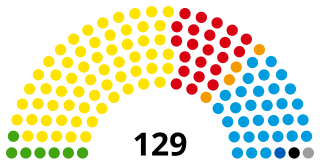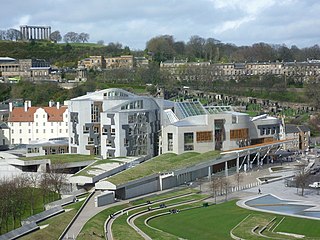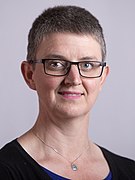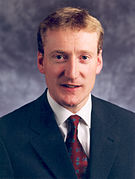The Scottish National Party is a Scottish nationalist and social democratic party. The party holds 62 of the 129 seats in the Scottish Parliament, and holds 9 out of the 57 Scottish seats in the House of Commons. It has 453 local councillors of the 1,227 available. The SNP supports and campaigns for Scottish independence from the United Kingdom and for Scotland's membership in the European Union, with a platform based on progressive social policies and civic nationalism. Founded in 1934 with the amalgamation of the National Party of Scotland and the Scottish Party, the party has had continuous parliamentary representation in Westminster since Winnie Ewing won the 1967 Hamilton by-election.

The Scottish Parliament is the unicameral legislature of Scotland. Located in the Holyrood area of the capital city, Edinburgh, it is frequently referred to by the metonym Holyrood. The Parliament is a democratically elected body comprising 129 members known as Members of the Scottish Parliament (MSPs), elected for five-year terms under the regionalised form of Additional-member system (MMP): 73 MSPs represent individual geographical constituencies elected by the plurality (first-past-the-post) system, while a further 56 are returned as list members from eight additional member regions. Each region elects seven party-list MSPs. Each region elects 15 to 17 MSPs in total. The most recent general election to the Parliament was held on 6 May 2021, with the Scottish National Party winning a plurality.

Scottish independence is the idea of Scotland regaining its independence and once again becoming a sovereign state, independent from the United Kingdom. The term Scottish independence refers to the political movement that is campaigning to bring it about.

The politics of Scotland operate within the constitution of the United Kingdom, of which Scotland is a country. Scotland is a democracy, being represented in both the Scottish Parliament and the Parliament of the United Kingdom since the Scotland Act 1998. Most executive power is exercised by the Scottish Government, led by the first minister of Scotland, the head of government in a multi-party system. The judiciary of Scotland, dealing with Scots law, is independent of the legislature and the Scottish Government, and is headed by the Lord Advocate who is the principal legal adviser to the Scottish Government. Scots law is primarily determined by the Scottish Parliament. The Scottish Government shares limited executive powers, notably over reserved matters, with the Scotland Office, a British government department led by the Secretary of State for Scotland.

The Scottish devolution referendum of 1997 was a pre-legislative referendum held in Scotland on 11 September 1997 over whether there was support for the creation of a Scottish Parliament with devolved powers, and whether the Parliament should have tax-varying powers. The result was "Yes–Yes": a majority voted in favour of both proposals, and the Parliament was established following an election in 1999. Turnout for the referendum was 60.4%.

A post-legislative referendum was held in Scotland in 1979 to decide whether there was a sufficient support for a Scottish Assembly proposed in the Scotland Act 1978 among the Scottish electorate. This was an act to create a devolved deliberative assembly for Scotland. A majority (51.6%) of voters supported the proposal, but an amendment to the Act stipulated that it would be repealed if less than 40% of the total electorate voted in favour. As there was a turnout of 64% the "Yes" vote represented only 32.9% of the registered electorate, and the act was subsequently repealed.
In Scotland, the Scottish National Party (SNP) is a left social democratic political party which campaigns for Scottish independence. The SNP has controlled Scotland's devolved legislature since the 2007 election as a minority government, and were a majority government from the 2011 election and have been a minority government, since the 2016 election.

Unionism in Scotland is a political movement which favours the continuation of the political union between Scotland and the other countries of the United Kingdom, and hence is opposed to Scottish independence. Scotland is one of four countries of the United Kingdom which has its own devolved government and Scottish Parliament, as well as representation in the UK Parliament. There are many strands of political Unionism in Scotland, some of which have ties to Unionism and Loyalism in Northern Ireland. The two main political parties in the UK — the Conservatives and Labour — both support Scotland remaining part of the UK.

Johann MacDougall Lamont is a Scottish Labour Co-operative politician who served as Leader of the Scottish Labour Party from 2011 to 2014. She was previously a junior Scottish Executive minister from 2004 to 2007 and Deputy Leader of the Scottish Labour Party from 2008 until her election to the leadership in 2011. In addition to her ministerial and leadership roles, she has been a campaigner on equality issues and violence against women throughout her political career.

The Scottish Conservative & Unionist Party is part of the UK Conservative Party active in Scotland. It holds 5 of the 57 Scottish seats in the House of Commons, 31 of the 129 seats in the Scottish Parliament, and comprises 206 of Scotland's 1,226 local councillors.
The Scottish Liberal Democrats is a liberal, federalist political party in Scotland, part of UK Liberal Democrats. The party holds 4 of the 129 seats in the Scottish Parliament 6 of the 57 Scottish seats in the House of Commons and 86 0f 1226 Local Councillors.
Full fiscal autonomy (FFA) – also known as devolution max, devo-max, or fiscal federalism – is a particular form of far-reaching devolution proposed for Scotland and for Wales. The term has come to describe a constitutional arrangement in which instead of receiving a block grant from His Majesty's Treasury as at present, the Scottish Parliament or the Senedd would receive all taxation levied in Scotland or Wales; it would be responsible for most spending in Scotland or Wales but make payments to the UK government to cover Scotland or Wales's share of the cost of providing certain UK-wide services, largely defence and foreign relations. Scottish/Welsh fiscal autonomy – stopping short of full political independence – is usually promoted by advocates of a federal United Kingdom.

Scottish devolution is the process of the UK Parliament granting powers to the devolved Scottish Parliament. Prior to the advent of devolution, some had argued for a Scottish Parliament within the United Kingdom – while others have since advocated for complete independence. The people of Scotland first got the opportunity to vote in a referendum on proposals for devolution in 1979 and, although a majority of those voting voted 'Yes', the referendum legislation also required 40% of the electorate to vote 'Yes' for the plans to be enacted and this was not achieved. A second referendum opportunity in 1997, this time on a strong proposal, resulted in an overwhelming 'Yes' victory, leading to the Scotland Act 1998 being passed and the Scottish Parliament being established in 1999.

A referendum on Scottish independence from the United Kingdom was held in Scotland on 18 September 2014. The referendum question was "Should Scotland be an independent country?", which voters answered with "Yes" or "No". The "No" side won with 2,001,926 (55.3%) voting against independence and 1,617,989 (44.7%) voting in favour. The turnout of 84.6% was the highest recorded for an election or referendum in the United Kingdom since the January 1910 general election, which was held before the introduction of universal suffrage.

The Scotland Act 2012 is an Act of the Parliament of the United Kingdom. It sets out amendments to the Scotland Act 1998, with the aim of devolving further powers to Scotland in accordance with the recommendations of the Calman Commission. It received royal assent in 2012.

In the United Kingdom, devolution is the Parliament of the United Kingdom's statutory granting of a greater level of self-government to the Scottish Parliament, the Senedd, the Northern Ireland Assembly and the London Assembly and to their associated executive bodies: the Scottish Government, the Welsh Government, the Northern Ireland Executive and in England, the Greater London Authority and combined authorities.
Events from the year 2014 in Scotland.

The 2014 Scottish Labour Party leadership election was an internal party election to choose a new leader and deputy leader of the Scottish Labour Party, following the resignations of Johann Lamont as leader and Anas Sarwar as deputy. Lamont announced her decision in an interview with the Daily Record on 24 October, saying that she was stepping down effective immediately because the UK Labour Party treated the Scottish party as a "branch office of London". Lamont, who had won the 2011 leadership contest, thus becoming the first Scottish leader to have authority over Labour's Scottish MPs in the House of Commons as well as in the Scottish Parliament, was the second leader of a Scottish political party to resign in the wake of the 2014 independence referendum. Before her resignation, Alex Salmond announced his intention to relinquish the role of Scottish National Party (SNP) leader and First Minister. Sarwar announced his own resignation on 30 October, saying he felt it was right for the party to elect a new leadership team.

The Scotland Act 2016 is an act of the Parliament of the United Kingdom. It sets out amendments to the Scotland Act 1998 and devolves further powers to Scotland. The legislation is based on recommendations given by the report of the Smith Commission, which was established on 19 September 2014 in the wake of the Scottish independence referendum.

A second referendum on Scotland becoming independent of the United Kingdom (UK) has been proposed by the Scottish Government. An independence referendum was first held on 18 September 2014, with 55% voting "No" to independence. The Scottish Government stated in its white paper for independence that voting Yes was a "once in a generation opportunity to follow a different path, and choose a new and better direction for our nation". Following the "No" vote, the cross party Smith Commission proposed areas that could be devolved to the Scottish Parliament; this led to the passing of the Scotland Act 2016, formalising new devolved policy areas in time for the 2016 Scottish Parliament election campaign.























